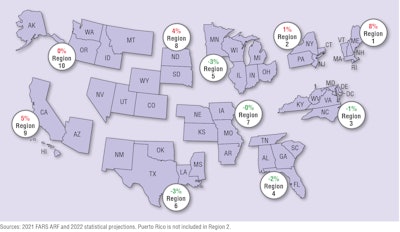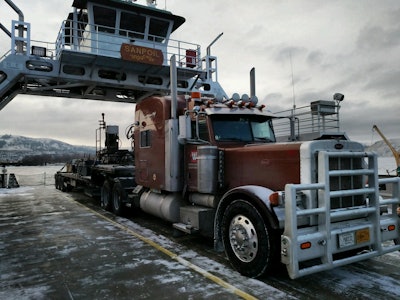Trucking news and briefs for Monday, April 24, 2023:
California bill would effectively ban autonomous trucks unless drivers are in-cab
A bill that effectively bans autonomous commercial trucks unless a driver is in the cab in California cleared another hurdle last week, passing the state Committee on Communications and Conveyance. Introduced in January, the legislation is authored by California Assembly Members Cecilia Aguiar-Curry (D-Winters), Tom Lackey (R-Palmdale), and Ash Kalra (D-San Jose), and previously passed the California Assembly Transportation Committee.
AB 316 prohibits an operation of an autonomous vehicle with a gross vehicle weight of 10,000 pounds or more on public roads for testing purposes, transporting goods or transporting passengers without a human safety operator physically inside the truck at the time of operation.
Ahead of the hearing, more than 55 business organizations and companies of all sizes interested in AV trucks signed a letter for the record opposing AB 316, with a roll of co-signers that include Institute for Safer Trucking, CalChamber, California Small Business Association, U.S. Xpress, California Manufacturers & Technology Association, California Hispanic Chamber, San Francisco Chamber of Commerce, and state-based AV companies.
"AB 316 continues to be an effective ban on this life-saving technology with no pathway for Californians to benefit from autonomous trucks," the group wrote in its letter. "Supporters of AB 316 have shown zero evidence that AV trucks are unsafe or will cause mass layoffs of truck drivers. This committee is being asked to take action based on nothing more than speculation."
The Teamsters and the California Labor Federation signaled support for the legislation. Randy Cammack, President of Teamsters Joint Council 42, noted the union's "fight for our members' good jobs and safety on the roads, as well as the safety of all California drivers," he said. "The public should not be treated as a lab rat for big corporations to test their technology."
California is home to more than a half-dozen developers of autonomous technologies, yet isn't one of the 22 states that allow the testing of driverless vehicles on the road with a gross weight over 10,000 pounds. Even as AB 316 passes through the California legislature, the California Department of Motor Vehicles (DMV) is considering a regulatory framework that would allow for autonomous vehicles over 10,000 pounds to hit the road, possibly within one year, without consent from the state legislature.
More than 4,250 motorists were killed on California roads in 2021 and more than 10% of crashes involved a large truck.
[Related: Flailing toward an 'automated future']
NHTSA estimates decrease in highway fatalities in 2022
 For the NHTSA regional differences, five of 10 regions are estimated to have increases in fatalities, and five of the 10 regions are estimated to have decreases in fatality rate per 100 million VMT in 2022 as compared to 2021. Also, 27 States, the District of Columbia and Puerto Rico are projected to have had decreases in fatalities.NHTSA
For the NHTSA regional differences, five of 10 regions are estimated to have increases in fatalities, and five of the 10 regions are estimated to have decreases in fatality rate per 100 million VMT in 2022 as compared to 2021. Also, 27 States, the District of Columbia and Puerto Rico are projected to have had decreases in fatalities.NHTSA
A statistical projection of traffic fatalities for 2022 from NHTSA shows that an estimated 42,795 people died in motor vehicle traffic crashes -- a marginal decrease of about 0.3% from the 42,939 fatalities reported to have occurred in 2021.
“We continue to face a national crisis of traffic deaths on our roadways, and everyone has a role to play in reversing the rise that we experienced in recent years,” said U.S. Transportation Secretary Pete Buttigieg.
After an 8.7% increase in traffic fatalities in the first quarter of 2022 compared to the same quarter the previous year, the second, third and fourth quarters of 2022 saw year-over-year fatality declines, with the fourth quarter netting a 2.5% drop in traffic deaths from 2021.
The decrease in fatalities came as total vehicle miles traveled (VMT) during the year increased by about 29.3 billion miles, or 0.9%, from 2021. The fatality rate in 2022 fell to 1.35 fatalities per 100 million VMT, down from the reported rate of 1.37 fatalities per 100 million VMT in 2021.
NHTSA noted that the fatality counts for 2021 and 2022 and the ensuing percentage change from 2021 to 2022 will be further revised as the FARS-reporting-system final file for 2021 and the annual report file for 2022 are available later this year.
NHTSA's preliminary fatalities report did not include statistics related to truck-involved crashes.
[Related: ELDs and highway safety: Crashes, injuries and fatalities rise post-mandate]
Owner-operator named 2022 ATA National Driver of the Year
 Owner-operator Jim Self, based in Rathdrum, Idaho, and leased to Billings, Montana-based Whitewood Transport, won ATA's 2022 National Driver of the Year award. The Peterbilt pictured is the fourth Self has owned. He pulls an East tri-axle drop deck.
Owner-operator Jim Self, based in Rathdrum, Idaho, and leased to Billings, Montana-based Whitewood Transport, won ATA's 2022 National Driver of the Year award. The Peterbilt pictured is the fourth Self has owned. He pulls an East tri-axle drop deck.
The award is presented to the driver who exemplifies excellence in safety, customer service, and professionalism. Self was selected by a panel of judges representing the trucking industry.
 Owner-operator Jim Self
Owner-operator Jim Self
"I am honored to receive this award," Self said. "Driving is not just a job for me, it's what I love to do. I take great pride in my work and in providing the best possible service to our customers. This award is a testament to the hard work and dedication of not just myself, but my colleagues at Whitewood and the entire transportation industry."
Self started his truck driving career in 1976 at 21 years old when he went to work for M. Bruenger, out of Wichita, Kansas. He drove as a company driver until 1996 when he bought his first truck while working at Yellowstone Trucking. In 2007, he leased on with Whitewood Transport, with whom he's still leased today.
[Related: Enter Overdrive's Trucker of the Year award program]
C.H. Robinson offering new freight, payment terms to highest-performing carriers
C.H. Robinson has announced updates to its carrier loyalty program, including changes in how carriers are scored and the benefits they can earn. First launched in 2016, the company’s Carrier Advantage Program rewards carriers that provide the highest level of tracking updates and the best on-time performance on their C.H. Robinson loads.
In the wake of two highly disrupted and volatile years in freight transportation, shippers are looking for greater reliability in tracking their freight and a return to pre-pandemic levels of service, the company said. The updates to the Carrier Advantage Program incentivize all carriers in C.H. Robinson’s extensive network to meet those higher expectations.
Carriers will now have access to different levels of freight based on their Carrier Advantage status, with top-performing carriers getting the most and earliest access to freight. Carriers earning the highest status also get better payment terms and better fuel discounts than carriers in the lower tiers, Robinson noted. The new scoring criteria went into effect April 3. Carriers can watch their progress with each load, but their status won’t change until May 2.
In the meantime, the brokerage added, it's helped carriers learn all their options for automating updates, enhanced its carrier app and website to save carriers time filling in required information, and added notifications to alert carriers when their tracking isn’t enabled or isn’t working.
All carriers working with C.H. Robinson are automatically enrolled in the loyalty program. Current carriers needing additional help to optimize their Carrier Advantage score and benefits can find out more at C.H. Robinson’s website, in the Navisphere Carrier app or by calling their C.H. Robinson representative.
from Overdrive https://ift.tt/SVY0hiw



Sourced by Quik DMV - CADMV fleet registration services. Renew your registration online in only 10 minutes. No DMV visits, no lines, no phone mazes, and no appointments needed. Visit Quik, Click, Pay & Print your registration from home or any local print shop.





0 comments:
Post a Comment